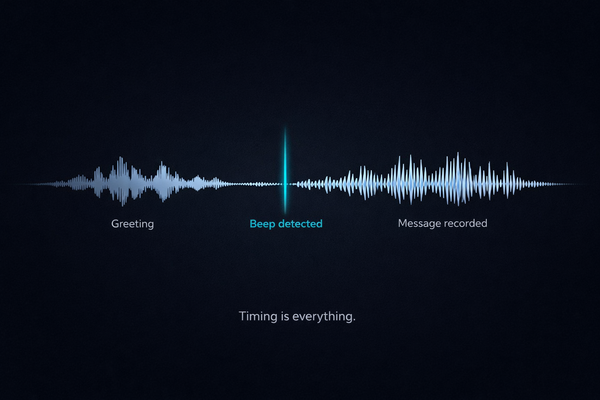[Insurance] Agentic AI in Insurance: Benefits, Challenges, and Future Outlook
![[Insurance] Agentic AI in Insurance: Benefits, Challenges, and Future Outlook](/content/images/size/w1200/2025/06/Untitled-design--2--1-1.png)
Customers' expectations are rising, risk environments are getting more complicated, and old ways of doing things like claims handling and underwriting are not working as well as they used to. This is a turning point for the insurance business. Policyholders want faster and more personalized services, but insurers have to deal with rising fraud and running costs. We need new ideas for answers more than ever. Agentic artificial intelligence is a cutting-edge technology that helps insurance companies maintain their competitive edge in a digital world that is rapidly evolving. This technology automates onerous activities, improves decision-making, and provides a personalized experience for each individual consumer.
Our Anyreach.ai AI-powered customer service tool uses agentic AI to change the way insurers work by allowing seamless automation, real-time insights, and high levels of efficiency. This blog talks about the problems that agentic AI can cause in the insurance industry, as well as the ways that it can solve them. It also looks ahead to see how it will affect the future of the industry.
What Is Agentic AI in Insurance?
Artificial intelligence (AI) systems that are capable of making autonomous decisions, learning from data that is being collected in real-time, and responding to complex situations without constant human supervision are referred to as agentic AI. Rules that have already been set are followed by traditional AI. The alternative, agentic artificial intelligence, utilizes techniques such as reinforcement learning, environmental analysis, and natural language processing to independently resolve issues.
It functions as an intelligent agent in the insurance industry, expediting the handling of claims, underwriting, and customer involvement while simultaneously providing solutions that are individualized and driven by data.
Why Agentic AI Matters for Insurers?
The insurance sector faces significant pressures: manual processes slow operations, fraud costs billions annually, and customers expect highly personalized experiences. A McKinsey report states that AI-driven solutions can reduce claims processing times by up to 70% and cut handling costs by 30%. Agentic AI addresses these challenges by:
- Automating repetitive tasks to free resources for strategic decision-making.
- Enhancing risk assessment with real-time data and predictive analytics.
- Improving customer satisfaction through tailored policies and faster claims resolution.
- Reducing fraud by detecting anomalies in real-time.
Agentic AI can help insurers improve operational efficiency, cut costs, and strengthen client relationships, making them industry leaders.
6 Key Benefits of Agentic AI in Insurance
Agentic AI gives insurers game-changing benefits that help them meet current needs. Here are some of the main benefits:
1. Enhanced Operational Efficiency
Agentic AI automates jobs that require a lot of work, like handling claims, managing policies, and reporting compliance. It speeds up processes and cuts down on mistakes by reducing the number of manual touchpoints. For instance, automated claims handling can handle papers, check claims, and give approvals in hours instead of weeks. This speeds up the process and lowers the cost of administration.
2. Personalized Customer Experiences
When agentic AI looks at data from places like customer contacts, social media, and Internet of Things (IoT) devices, it makes policy suggestions that are specific to each person's actions and requirements. Personalization like this makes customers happier and more likely to stick with you. Chatbots powered by AI, like the ones given by Anyreach.ai, offer support 24 hours a day, seven days a week. They answer questions and help policyholders make difficult decisions in real-time.
3. Advanced Fraud Detection
According to WNS DecisionPoint, insurance theft costs the business about 34 billion dollars every year. Agentic AI uses machine learning to look at very large datasets, find trends that don't make sense, and instantly report possible fraud. By using technologies like blockchain, it makes sure that claims are verified clearly and safely, which cuts down on financial losses and boosts trust.
4. Improved Risk Assessment
Traditional risk models are based on data that doesn't change, so they don't always take into account things that do, like climate change or changes in the economy. Real-time data feeds, like IoT and geospatial data, are used by agentic AI to provide accurate risk profiles and dynamic underwriting. This leads to more fair pricing, fewer policies that are priced wrong, and strategic risk reduction.
5. Cost Savings and Scalability
According to McKinsey, operational costs can make up 20 to 30% of expenses for property, casualty, and life insurance companies. Agentic AI cuts these costs by automating routine chores and making the best use of resources. Its ability to grow with the business means that insurance can handle more data and changes in the market without having to pay more.
6. Revenue Growth Through Personalization
Agentic AI looks at customer data to suggest related products, which makes cross-selling and upselling possible. For example, it can offer more coverage if a person's life changes, like when they buy a new home. This meets customer needs and increases revenue.
How Agentic AI Empowers Your Insurance Business?
Agentic AI revolutionizes insurance operations by automating complex tasks, enhancing decision-making capabilities, and delivering highly personalized customer experiences. Below are eight compelling use cases that illustrate how this technology, subtly enhanced by platforms like Anyreach.ai, empowers your business to tackle industry challenges with a fresh, customer-focused approach that prioritizes efficiency and trust.
1. Automated Claims Settlement
Challenge: Manual claims handling is a slow, error-prone process that delays settlements and diminishes customer satisfaction, with claims-related costs consuming up to 70% of collected premiums, according to AWS.
Solution: Agentic AI speeds up the whole claims process by using advanced image recognition to quickly evaluate damage and natural language processing to read and understand documents. It also finds possible fraud in real-time.
Anyreach.ai's platform speeds up claims handling with smart automation, making sure that problems are fixed quickly and correctly. This builds trust among policyholders and cuts operational costs by a large amount.
2. Enhanced Risk Assessment
Challenge: Traditional risk models, rooted in static data, fail to adapt to dynamic factors like climate change, economic volatility, or shifting customer behaviors, leading to inaccurate risk profiles.
Solution: Agentic AI harnesses real-time data from IoT devices, geospatial analytics, and other sources to generate precise risk assessments and proactive mitigation strategies tailored to current conditions.
Anyreach.ai seamlessly integrates to deliver data-driven risk insights, enabling your agency to craft competitive, customized policies with enhanced accuracy and agility.
3. Advanced Fraud Detection
Challenge: Fraudulent claims cost insurers billions annually, undermining financial stability and eroding customer trust in the industry.
Solution: Agentic AI employs predictive analytics and real-time anomaly detection to monitor transactions, swiftly identifying suspicious patterns and preventing fraudulent activities.
Anyreach.ai’s secure technology bolsters fraud prevention efforts, reducing financial losses and ensuring regulatory compliance, allowing your team to focus on strategic priorities.
4. Proactive Customer Engagement
Challenge: Generic insurance products and sluggish response times contribute to low customer satisfaction, with less than 29% of customers expressing contentment with their providers, per Accenture.
Solution: Agentic AI leverages sentiment analysis and comprehensive customer data to deliver personalized interactions and proactive communication through intelligent chatbots, fostering stronger connections.
Anyreach.ai’s empathetic AI agents enhance customer engagement, building loyalty through tailored, real-time support that resonates with policyholders.
5. Cost-Efficient Operations
Challenge: Manual workflows and compliance tasks inflate costs, with general and administrative expenses accounting for 20-30% of operating costs in insurance companies, according to McKinsey.
Solution: Agentic AI automates routine administrative functions, such as policy updates and compliance reporting, optimizing resource allocation and minimizing errors to drive efficiency.
Anyreach.ai’s scalable platform reduces operational costs, empowering your agency to redirect resources toward strategic growth initiatives with ease.
6. Adaptive Policy Adjustments
Challenge: Policies often become outdated as customer circumstances evolve, with 40% of customers considering cancellation due to irrelevant coverage, as per McKinsey.
Solution: Agentic AI continuously monitors real-time data, including IoT inputs and life events, to dynamically adjust coverage, ensuring policies remain relevant and valuable.
Anyreach.ai supports proactive policy adjustments with clear, effective communication, enhancing customer retention and unlocking revenue through timely updates.
7. Real-Time Underwriting
Challenge: Traditional underwriting, based on static historical data, leads to generic policies and inefficient risk evaluation, with potential efficiency gains of 30-50%, per McKinsey.
Solution: Agentic AI analyzes real-time data streams, including applicant behavior and market trends, to generate dynamic, personalized underwriting decisions for accurate pricing and risk classification.
Anyreach.ai streamlines underwriting processes, enabling tailored policies that attract diverse customers and boost profitability with minimal effort.
8. Tailored Insurance Products
Challenge: Standardized products fail to address diverse customer needs, driving dissatisfaction and limiting revenue, with personalization capable of boosting revenue by 10-15%, per McKinsey.
Solution: Agentic AI constructs detailed customer profiles using data from social media, IoT devices, and purchase history to create customized policies, such as pay-as-you-go car insurance or lifestyle-based health plans.
Anyreach.ai delivers personalized offerings through intelligent, data-driven insights, increasing customer loyalty and revenue with streamlined implementation.
Challenges of Implementing Agentic AI in Insurance
Agentic AI has a lot of benefits, but it also has some problems that insurers need to solve:
- Data Quality and Integration: Agentic AI depends on data that is both high quality and well-integrated. Old systems and data that are stored in separate areas can slow things down, so you need a strong data infrastructure.
- Ethical Considerations and Bias: AI models may unintentionally reinforce biases if they are not regularly checked. Transparency and fairness must be top priorities for insurers.
- Regulatory Compliance: Strict rules like GDPR and HIPAA require AI systems to be safe and follow the rules. To make sure they follow the rules, insurers must work with lawyers.
- Security Risks: Dealing with private customer information raises the chance of cyberattacks. Strong encryption and threat monitoring are must-haves.
- Workforce Resistance: Workers may be afraid of losing their jobs. To encourage acceptance, change management and training must work well.
To solve these problems, Anyreach.ai provides safe, adaptable AI solutions that work well with current systems. These solutions guarantee security and compliance while giving insurers the tools they need to get past execution problems.
Future Outlook for Agentic AI in Insurance
Agentic AI has a bright future in insurance, and new trends are about to change the field even more:
- Integration with IoT: Using agent-based AI with IoT gadgets like health monitors and telematics lets you keep an eye on risks in real-time and make personalized policies.
- Enhanced Predictive Analytics: More advanced machine learning will make it easier to predict risks, find scams, and study how customers behave.
- AI-Driven Virtual Assistants: Chatbots powered by agentic AI, like those from Anyreach.ai, will offer 24/7, context-aware help, making the customer experience better.
- Ethical AI and Governance: Paying more attention to ethical AI will make sure that things are open and fair and that new rules are followed.
- Evolving Underwriting and Claims: Agentic AI will keep simplifying complicated processes so that choices can be made faster and more accurately.
Final Thoughts
Agentic AI is changing the insurance business by automating tasks, making the customer experience better, and promoting growth at a low cost. It helps insurers keep up with modern needs while staying competitive by streamlining claims and making plans more tailored to each person. But in order for adoption to go smoothly, problems like data quality, compliance, and worker readiness need to be fixed.
Anyreach.ai's AI customer service platform gives insurance a safe, scalable, and flexible way to use the full power of agentic AI. We help insurers change how they do business and gain customers' trust by integrating with their current systems and putting compliance first. Are you ready for your insurance business to change? Are you ready for your insurance business to change? Get a demo to see how our AI chat agents can help your business.
FAQs
What are the key components of agentic AI?
Agentic AI comprises perception, reasoning, learning, and action. It analyzes environments, makes autonomous decisions, and adapts based on new data to achieve specific goals.
What are the challenges of agentic AI?
Challenges include data quality, ethical considerations, regulatory compliance, and security risks. Anyreach.ai mitigates these through robust data integration, compliance-focused solutions, and secure systems.
Is agentic AI a hype?
Agentic AI is not hype. A Fintech Global survey found that 71% of participants believe AI agents enhance workflow automation, and 64% see improvements in customer service, proving its tangible impact.
How can AI help an insurance agency?
AI helps agencies by automating tasks, improving risk assessment, detecting fraud, and personalizing customer experiences, leading to cost savings, higher efficiency, and increased customer satisfaction.
Will AI replace insurance agents?
AI is unlikely to fully replace agents but will augment their roles. Agents will focus on complex tasks and relationship-building, while AI handles routine processes, as supported by Anyreach.ai’s human-in-the-loop approach.
What is the common use of AI in the insurance industry?
Among the most common applications are automated claims processing, fraud detection, dynamic underwriting, and customer care through the use of AI chatbots. All of these applications combine to improve efficiency and customer happiness.




![[AI Digest] Agents Coordinate Plan Deploy Scale](/content/images/size/w600/2025/07/Daily-AI-Digest.png)